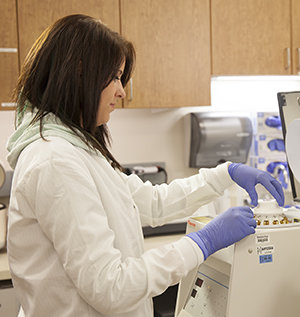Clinical Pathology Overview
What is clinical pathology?

Clinical pathology covers many lab functions. It is concerned with disease diagnosis, treatment, and prevention. Clinical pathologists are healthcare providers with special training. They often direct all the special divisions of the lab. This may include the following:
Clinical pathology also includes maintenance of information systems, research, and quality control.
What does a clinical pathologist do?
Clinical pathologists look at blood, urine, and other body fluid samples under a microscope, or with other diagnostic tools. They watch levels of certain chemicals or other substances in the body. A diagnosis or decision to do further study is then made based on the test results. Samples for exam can include any of these:
Types of specimens used in clinical pathology
|
Specimen
|
How it's collected
|
|
Blood
|
Blood is used in many tests. It can be checked in these ways:
Blood is often drawn with a needle from a vein, often in the forearm. Sometimes the tip of the finger is pricked and then squeezed to draw blood.
|
|
Urine
|
Urine is also used for many tests. Urine samples can be collected by:
-
Random method. The person urinates in a cup or larger container (if 24-hour collection).
-
Clean catch specimen. The outer genital area has been cleaned before urinating in a cup.
-
Sterile urine test. This needs catheterization. A tube is put into the urethra and goes to the bladder to get urine.
Sometimes a healthcare provider will need you to do a timed test. This is to measure substances passed into the urine over several hours.
|
|
Sputum (phlegm)
|
Sputum can be coughed into a clean container. Sometimes it is removed with a suction catheter or a scope (bronchoscope).
|
|
Stool (feces)
|
Stool is often collected by the person in a clean cardboard or plastic container.
|
|
Other body fluids
|
Other body fluids collected for testing may include:
|
A clinical pathologist may be in charge of the blood bank in a hospital. This includes collecting and processing blood and blood products. Other duties may include looking at the causes of transfusion reactions and checking tissue compatibility for transplants.
Other branches of pathology include:
-
Anatomic pathology. The study of tissues, organs, and tumors.
-
Cytopathology. The study of cellular changes and everything related to cells.
-
Forensic pathology. Doing autopsies and legal pathology tests.
-
Molecular pathology. The study of DNA and RNA sequencing, genes, and genetics.
Some pathologists specialize in these different areas.